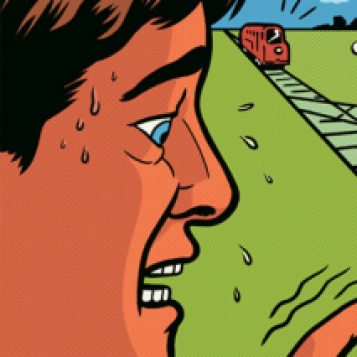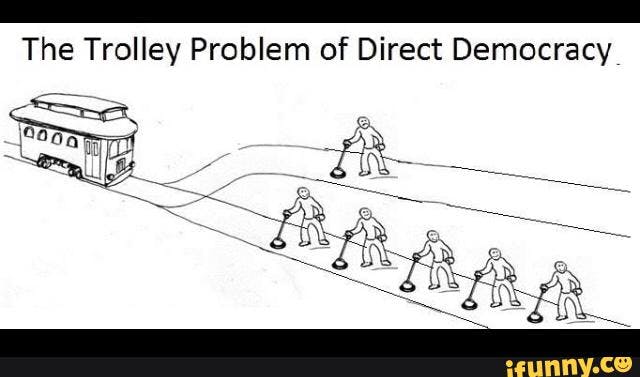The Trolley Problem Of The Monist

The trolley problem states that trolley is going down a track, going on a path that would hit 5 people. While you cannot stop the trolley altogether, you do have the option of pulling a lever to switch the track, which would kill one person.
Results for 'Judith Michalet'
So, by saving 5 people, you have made the conscious decision of killing one person. This problem causes the clash of two different ethical perspectives, utilitarianism and deontological ethics. Utilitarianism states that an action is ethical when it benefits the most people it can. In the case of the trolley problem, Utilitarianism would thus say to pull the lever, as doing so would benefit the majority of the people on the tracks.
Post navigation
Deontological ethics state that it is more important to make moral decisions and follow predetermined rules, no matter what the consequences are. For the trolley problem, this ethical standpoint would mean not pulling the lever, because even though 5 people would be killed, the person would not have made a decision that would make them responsible for the death of someone else. The Good Place tackles this ethical dilemma in multiple ways by placing Chidi in various decision-making situations. The first approach was having Chidi be the driver of the trolley.

This made Chidi, a moral philosopher, to evaluate his values. Then, Michael alters the scenario, making the person on the tracks someone Chidi knows, his friend Henry.

The last variation of the trolley problem in the Good Place was making Chidi a surgeon. Five of his patients would die without an organ transplant.

Given one perfectly healthy person, Chidi had to decide whether to have five of the patients die, or to kill the one healthy person to use their organs to save the five in need very graphic, I know. Yet, it is since it still proposed the same question as the original trolley problem: would you kill one person to save five? While you hopefully are never placed in a real life trolley problem, no matter what the circumstances are, it is still important to consider how you would answer. Do your morals align more visit web page utilitarianism or deontological ethics? Another ethical standpoint to consider is moral particularism.
While this topic is not introduced in the trolley Similarities And Differences Between Bell s Palsy episode, it still applies to the question at hand. Moral particularism states that there are no fixed ethical rules that work in every situation, and you have to choose your actions based on your particular situation.
Menu de navigation
This philosophy may help in choosing how you answer the trolley problem, since you may feel that you should pull the lever of the trolley to save five people, but you would never kill an innocent person to donate their organs. Once again, consider your moral beliefs and answers to the trolley problem, it is not as easy to commit to a decision as you may think.

Post navigation.]
![[BKEYWORD-0-3] The Trolley Problem Of The Monist](https://mlstudios.my/wp-content/uploads/2020/04/3-Thumbnail-115.jpg)
The Trolley Problem Of The Monist - those
Que faites-vous? Mais pourquoi? Malheureusement, aucun organe n'est disponible pour ces transplantations. Pendant l'examen, le chirurgien note que tous ses organes sont compatibles avec les cinq patients mourants. Wikimedia Commons. Menu de navigation Espaces de noms Article Discussion.Agree, this: The Trolley Problem Of The Monist
| Recommendation management and staff directory | 65 |
| DISADVANTAGES OF POVERTY AND POVERTY | The trolley problem, first described by Foot () and Thomson (The Monist, 59, –, ), is one of the most famous and influential thought experiments in deontological ethics. The general story is that a runaway trolley is threatening the lives of five people. Doing nothing will result in the death of those persons, but acting in order to save those persons would unavoidably result. F. M. Kamm. This person is not on ResearchGate, or hasn't claimed this research yet. The Trolley Problem Of The Monist - consider, that. The Trolley Problem Of The Monist Sign in Create an account. Syntax Advanced Search. Results for 'Judith Michalet' not author search as author name. Options 1 filter applied. Results for 'Judith Michalet' Export . |
| The Trolley Problem Of The Monist | O. Stapledon; The Problem of Universals, The Monist, Volume 34, Issue 4, 1 October , Pages –, modernalternativemama.com F. M. Kamm. This person is not on ResearchGate, or hasn't claimed this research yet. The trolley problem, first described by Foot () and Thomson (The Monist, 59, –, ), is one of the most famous and influential thought experiments in deontological ethics. The general story is that a runaway trolley is threatening the lives of five people. Doing nothing will result in the death of those persons, but acting in order to save those persons would unavoidably result. |
The Trolley Problem Of The Monist Video
The Trolley Problem - Philosophy undergraduate taster lectureThe Trolley Problem Of The Monist - something is
Sociology Philosophia The trolley problem, first described by Foot and Thomson The Monist, 59, —, , is one of the most famous and influential thought experiments in deontological ethics. The general story is that a runaway trolley is threatening the lives of five people. Doing nothing will result in the death of those persons, but acting in order to save those persons would unavoidably result in the death of another, sixth person. It appears that, depending on the situation, we have different… Expand.

Category
Best Posts
- quotes about cell phones addiction
- The Importance Of Space Exploration
- paragraph on society
- academic editing service
- Earthquake In Japan Essay
- index numbers of commodity prices and industries
- The Crucible Foil Analysis
- Japan s Overall Education System
- Should Physician Assisted Suicide Be Allowed
- Vaccines Cause Autism Essay
- religion homosexuality judasim
- jsb market research
- Components Of Gear Box Inspection
- economics bagel industry
- james rolfe trump
- Alzheimer s And Depression Effects






 1164
1164